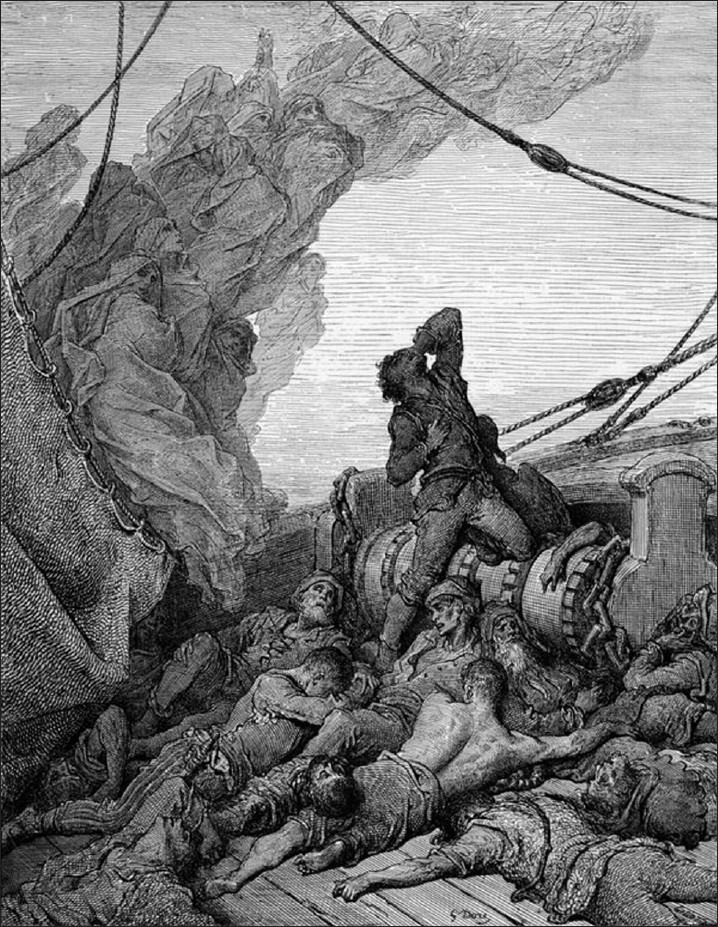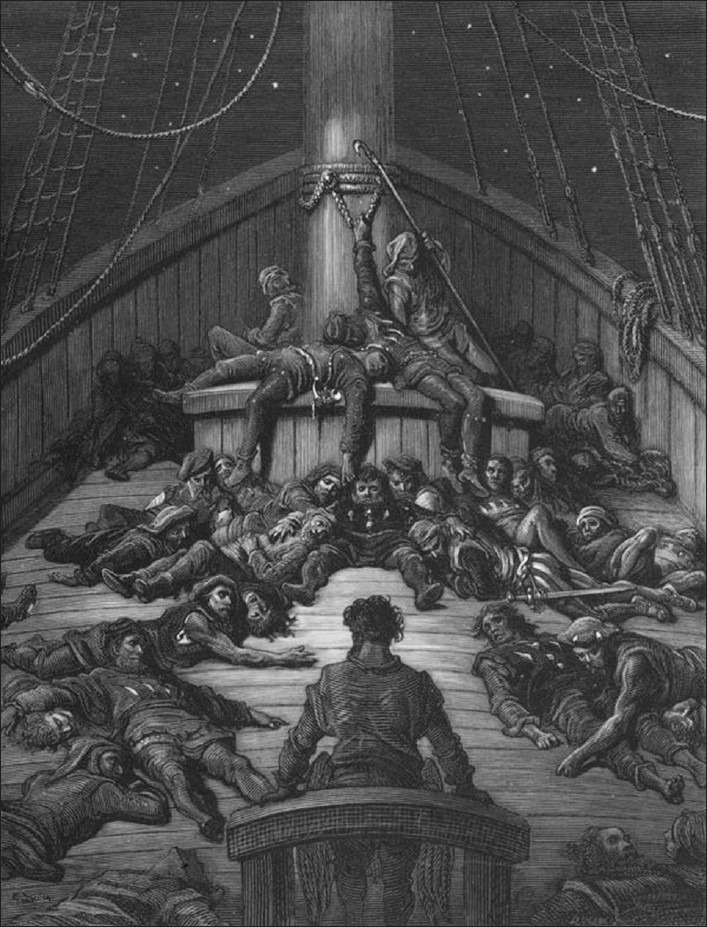Abstract
The Rime of the Ancient Mariner was written by Coleridge and is a classic poetry about retribution, punishment, guilt, and curse. Religious beliefs and delusions can arise from neurologic lesions and anomalous experiences, suggesting that at least some religious beliefs can be pathological. Looking at the poem through the psychiatric and psychological domain, the symbolism, the narration and the entire setting of the poem represents Post Traumatic Stress Disorder. Mariner′s reactions are beautifully portrayed from the psychoanalytic point of view and the literary piece shows claustrophobia, stygiophobia, dikephobia, and poinephobia. The mental stress of a person under a crisis situation has remarkably been evoked in this poem. This incredible piece of art expresses how the realization of divine love within oneself has the power to heal pain and suffer.
Keywords: Post traumatic stress disorder, phobias, poetry
DECLARATION OF FUNDING SOURCE
There was no funding received for this study from any source.
The Corresponding Author has the right to grant on behalf of all authors and does grant on behalf of all authors, an exclusive licence on a worldwide basis to the journal for all printed and/or commercial publication, distribution, or reproduction of the work.
COMPETING INTERESTS
The authors have no competing interests in the publication of this manuscript to declare
The Rime of the Ancient Mariner was written by Samuel Taylor Coleridge (1772-1834). It was first published in Lyrical Ballads, with a few other poems in 1798.
“The Rime of the Ancient Mariner” is all about retribution, punishment, guilt, and curse.[1] The Ancient Mariner in the poem has to pay for an impulsive act of killing the Albatross. The spiritual world takes revenge of the Albatross′s death by inflicting physical and psychological havoc on the Ancient Mariner and his shipmates. The sailors have to face harsh and extensive punishment before their death. Their strength and vitality are impaired. They are taken to a frantic and hallucinating stage. Thirst and heat torments them. They suffer due to the Ancient Mariner′s killing of Albatross. The sailors meet death but the Ancient Mariner is gift of Life-in-Death. He is given the punishment because of his ghastly act and bears the curse. He lives a hellish life on this earth, speaking beyond his grave. He is like a ghost warning everybody about the harsh punishment and consequences of sinning against the creation of God.
The Ancient Mariner symbolises a universal sinner and all the sailors represent the human beings who too are guilty of being accomplice in crime. Albatross symbolizes a Christian soul. It brings good omen for the ship but faces the cruelty of the Mariner that turns into a burden, guilt, an obstacle for the Ancient Mariner, the dead body of which is hung around his neck by the sailors. We see delusion of faith. In English law, delusion has been the cardinal feature of insanity for the last 200 years.[2]
A spirit had followed them; neither departed souls nor angels. “And some in dreams assured were Of the Spirit that plagued us so; Nine fathom deep he had followed us From the land of mist and snow.” (Part II)
Some religious beliefs can be pathological. They exist outside of the purview of scientific explanations; therefore, quite easily can be branded as delusional from the point of view of rationality. In clinical practice, there are no clear guidelines to differentiate “normal” religious beliefs from “pathological” religious delusions. Religious beliefs and delusions can arise from neurologic lesions and anomalous experiences, suggesting that at least some religious beliefs can be pathological.
There is a delusion of control. It is a delusion in which one′s feelings, impulses, thoughts, or actions are likely to be controlled by some external forces or agencies rather than being controlled by oneself. Obsessed and under tension, the mariner does not have a peace of mind. He is confused and jittery and acts as one “possessed”. The Mariner is forced to wear the bird about his neck as a symbol of guilt.
“Instead of the cross, the Albatross / About my neck was hung”.
Coleridge, the poet of this poem was a known user of opium.[3] The delusions and hallucinations caused due to the drug seem to have forced him to write about some strange parts like the ′Voices of The Spirits′ [Figure 1] communicating with each other. Looking at the poem through the psychiatric and psychological domain, the symbolism, the narration and the entire setting of the poem represents Post Traumatic Stress Disorder (PTSD). The Mariner suffers from survivor′s guilt and his condition worsened as he saw all the sailors dying in front of him. Mariner is a lone survivor. He becomes closed-off psychically and finds himself trapped in a profound sense of guilt [Figure 2]. There is an irreparable psychic wound. Every action of the Mariner seems psychoid, which is beyond psychical and psychological explanation in texture nature and essence.
Figure 1.

Gustave Dore′s illustrations to The Rime of the Ancient Mariner. No saint took pity
Figure 2.

Gustave Dore′s illustrations to The Rime of the Ancient Mariner. And yet I could not die
Some other accompanying emotions during PTSD are extreme anxiety and phobias of various kinds. Traumatic events can trigger phobias and irrational thinking, which can ultimately culminate into delusions and this exactly happens with the Mariner. Mariner realises the nature of his guilt after killing the bird in a cold blood. He suffers punishment both mentally and physically. The Ancient Mariner is punished by the natural world and the spiritual world. The punishment is in the form of the Mariner′s deprivation of natural elements, depravation of food and water:
“Water, water, every where, Nor any drop to drink.”
Suffering from such a great physical and mental punishment, he becomes a living dead. He is under the bout of constant pain and has the constant urge to tell others in order to momentarily relieve his pain:
“That agony returns: And till my ghastly tale is told, This hurt within me burns.” Upon the death of his two hundred mates in Part III of the poem, he is psychologically deranged. The autonomic symptoms of PTSD clearly become visible here. There is frequent reliving of the events as the Mariner is compelled to repeat the events to whomsoever he met. There is a feeling of helplessness and entrapment.
“And every tongue, through utter drought Was withered at the root We could not speak, no more than if We had been choked with soot”
In Part IV, the Mariner explains his condition by saying “For the sky and the sea, and the sea and the sky, Lay like a load on my weary eye, And the dead were at my feet”
These lines portray encirclement…the Mariner feels trapped. He suffers from Claustrophobia. The psychological strain reaches its extreme limit when even the Sun appears to be behind the bars to the Mariner.
And straight the sun was flecked with bars,
As if through a dungeon-grate he peered (Part III)
Another phobia which overtakes him is Stygio phobia, an irrational fear of hell. Its symptoms are breathlessness, excessive sweating, dry mouth, nausea, feeling sick, heart palpitations, and inability to speak or think clearly, a fear of dying, a sensation of detachment from reality or an anxiety attack.
“But oh! more horrible than that Is the curse in a dead man′s eye! Seven days, seven nights, I saw that curse, And yet I could not die”(Part IV)
The blackness of his sin fills within him horror of being sent to hell. The crime arouses the wrath of supernatural spirits who then pursue the ship “from the land of mist and snow”. But as soon as he starts loving and respecting the creation of God the curse begins to recede. The Mariner thus becomes a victim of multi phobias, another one of which is dike phobia - a fear of justice. As this phobia triggers there is excessive anxiety. The Mariner becomes the gift of Life-in-Death is symbolic of this phobia. Dike phobia culminates into Poinephobia, which is a fear of punishment.
“God save thee, ancient Mariner, From the fiends that plague thee thus! - Why look′st thou so?′ -“With my crossbow I shot the Albatross.” (Part I)
In Part III he feels that the spiritual world is reprimanding him, holding him responsible for the death of the sailors. His sufferings multiply by being forced to watch his crew being released: “The souls did from their bodies fly, They fled to bliss or woe! And every soul, it passed me by, Like the whizz of my cross-bow.”
But as soon as a spiritual transformation in him occurs, he is able to see the true beauty in all the ′ugly creatures′ and ′slimy things′. He blesses them. “a spring of love gush′d from my heart” (Part IV).
Now he manages to pray, the albatross falls from his neck and his guilt is partially expiated. “He prayeth best who loveth best All things both great and small; / For the dear God who loveth us, / He made and loveth all” (Part VII).
The ship with dead bodies, possessed by good spirits, steers back home and sinks in a whirlpool. The Mariner is left behind. As penance he wanders around and narrates his story to teach and preach.
Many psychiatric symptoms are explained in the presence of religious belief like:
Shared delusion: Seen in Mariner′s communication with the wedding guests
Overvalued idea: Seen Life-in-Death
Culturally held shared belief: Seen killing of a Christian soul
Hallucination: ′Hearing′ the voices of the Spirits
Disorder of volition: “Through utter drought all dumb we stood, I bit my arm, I sucked the blood” (Part III)
Some other symptoms seen are paranoia, anxiety disorder, depression or elation, and depersonalisation. Mariner′s reactions are beautifully portrayed from the psychoanalytic point of view. With his careful craftsmanship, fear psychosis is relevantly produced. The mental stress of a person under a crisis situation has remarkably been evoked in this poem. This incredible piece of art expresses how the realization of divine love within oneself has the power to heal pain and suffer.
Footnotes
Source of Support: Nil
Conflict of Interest: None.
REFERENCES
- 1.Coleridge ST. The Rime of the Ancient Mariner. In: Coffin CM, editor. The Major Poets: English and American. Harcourt, New York: Brace and World; 1954. pp. 274–292. 1798. [Google Scholar]
- 2.West DJ, Walk A. Daniel McNaughton: His Trial and the Aftermath. Ashford: Headley Brothers; 1977. [Google Scholar]
- 3.Hubble D. Opium addiction and English literature. Med Hist. 1957;1:323–35. doi: 10.1017/s0025727300021505. [DOI] [PMC free article] [PubMed] [Google Scholar]


